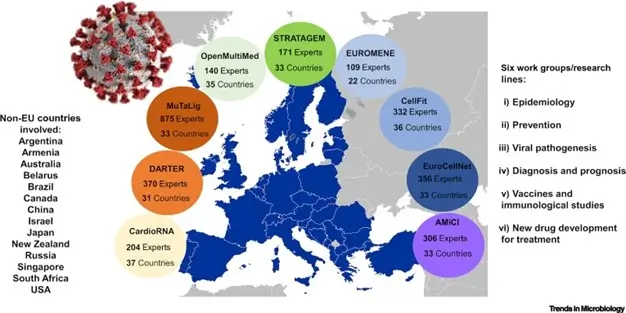Addressing societal issues by enabling cross-disciplinary partnerships is an inherent part of a COST Actions’ nature. But collaborations don’t stop at the gate of these specific networks: multiple COST Actions have joined forces since the beginning of the pandemic to help advance research into COVID-19. After more than a year, these collaborations have not only continued amongst the different COST Actions, but novel partnerships sparked beyond the COST programme continue to blossom as well. Knowledge-sharing and collaborations with different institutions, stakeholders, and European projects lead to new co-achievements which help to tackle specific matters related to the COVID-19 crisis at large.
Here we place the spotlight on some of the latest milestones reached thanks to these “all-round partnerships”:
1) Co-achievements of Network of COST Actions
In March 2020, the seed of a novel joint venture was planted when nine COST Actions joined forces as the Trans-Actions network. Set up to improve preparedness for future pandemics, this original network comprised 2863 researchers from 49 countries. The COST Programme welcomed this bottom-up initiative and has helped to coordinate these growing collaborations through facilitating interactions, and supporting the development and dissemination of the network’s achievements. From the original 9 Actions, the network has thus flourished into a mega-network of 76 Actions across 12 scientific fields, referred to as the “Network of COST Actions against COVID-19” (NoA).
Laying the ground for new strategies to combat future pandemics
The members of the original network of 9 COST Actions, the Trans-Actions network, described the impetus for uniting the complementary skills available across the COST community in their publication “Joining European Scientific Forces to Face Pandemics” (Trends in Microbiology, Cell Press):
“Despite the international guidelines on the containment of the coronavirus disease 2019 (COVID-19) pandemic, the European scientific community was not sufficiently prepared to coordinate scientific efforts. To improve preparedness for future pandemics, we have initiated a network of nine European-funded Cooperation in Science and Technology (COST) Actions that can help facilitate inter-, multi-, and trans-disciplinary communication and collaboration.”.
The authors have elaborated on the added value of the collaborations enabled by this network:
“The sharing of basic research expertise (e.g., cellular models to simulate SARS-CoV-2 adhesion and replication, techniques to monitor viral proliferation and cell damage, tools for drug synthesis and drug-target prediction, platforms for drug screening, computational modeling, and artificial intelligence-based algorithms) and translational information (e.g., clinical databases reporting information of diagnosis and follow-up of COVID-19 patients, biological samples such as blood and exhaled breath condensate) has favoured the complementation of skills and the development of collaborations.”
Coordinating scientific effort in Europe and beyond, and integrating activities with other similar networks in non-European countries will contribute to the development of faster and more effective ways to prevent, control, and treat pandemics, with obvious health and social benefits. “What we learn from the ongoing COVID-19 pandemic will help us to establish strategies to combat future pandemics. In this sense, the current pandemic may become a paradigmatic ‘opportunity’ for future pandemic mitigation strategies”.
The network has been organised into six working groups (Figure 1) which gather critical mass from diverse disciplines, from virology to sociology.

In their publication, the authors describe the varied early achievements generated by the Trans-Actions network. For example, the development of the COVEX software and the Drug Repositioning and Cooperation Database (DRACD) gives researchers the ability to study the virus-host interactome, find putative drug targets and investigate the possibility of repurposing existing drugs – all integrated into a freely-available web-based tool.
An additional initial success in terms of public health activities was the involvement of one of the network’s Actions in the preparation of guidelines on ‘Clinical, biochemical, immunogenetic paradigms of COVID-19 infection and their correlation with socio-demographic, etiological, pathogenetic, diagnostic, therapeutically and prognostically relevant factors’, which is part of the Latvian ‘COVID-19 MITIGATION’ program. This involvement will be supported by the network’s wide range of expertise.
The 9 COST Actions involved in the original network are: STRATAGEM; CardioRNA; OpenMultiMed; CellFit; DARTER; MuTaLig; AMiCI; EUROMENE; EuroCellNet)
2. COVAC-2 vaccine harnesses COST Action ENOVA’s adjuvants research
The COST Action ENOVA brings together experts and stakeholders to address one of the most critical steps in vaccine development: the use of adjuvants in vaccine formulations. Two partners of this Action, VFI (Vaccine Formulation Institute) and Seppic, developed the adjuvant Sepivak-SWEMT, which has been used as a component of the COVAC-2 vaccine against SARS-COV2.
The COVAC-2 vaccine has been developed by VIDDO (Vaccine and Infectious Disease Organization at the University of Saskatchewan) in Canada. Phase 1 of the clinical trial in healthy volunteers had positive results, demonstrating safety of the vaccine and the required activation of the immune system. In Phase 2 of the clinical trial, the level of protection will be evaluated.
The adjuvant is now freely available to the vaccine development community for human vaccines. More information here.
3. EMM Survey Registry’s COVID-19 collection: a public resource for understanding the COVID-19 experience of ethnic and migrant minorities in Europe
COST Action ETHMIGSURVEYDATA brings together researchers, policy makers, and survey data producers to join efforts to improve the access, usability, dissemination and standards of the multiple and scattered survey data that exist on the economic, social and political integration of ethnic and migrant minorities (EMMs).
Since the start of the pandemic in 2020, a growing number of COVID-19 surveys have been conducted with EMM respondents across the world.
In this context, ETHMIGSURVEYDATA has partnered with the H2020 SSHOC project and the ANR project FAIRETHMIGQUANT to launch a special COVID-19 collection for its EMM Survey Registry: a free online tool for discovering and learning about existing quantitative surveys undertaken with EMM (sub) populations in Europe and beyond.
This tool not only brings together previously scattered information about these surveys but also offers detailed and structured metadata for each of the surveys. Designed with the end-users in mind, this tool can also easily be leveraged by anyone interested in doing research or policy-related work using quantitative surveys on EMMs’ integration and inclusion.
This COVID-19 collection, which is a public resource co-created with data producers, provides detailed information about each of the surveys it includes and covers; as such, the COVID-19 collection will help improve access and visibility of COVID-19 surveys undertaken with EMM respondents.
Currently, the COVID-19 database captures 8 surveys from 3 different countries (all searchable using the keyword ‘COVID-19’). In the coming months, additional surveys will be contributed to the COVID-19 collection by data producers for across Europe.
More information:
COST Action booklet here
COST Actions unite efforts in the fight against COVID-19, April 2020 article here
COST Actions and COVID-19 page on COST Website here
